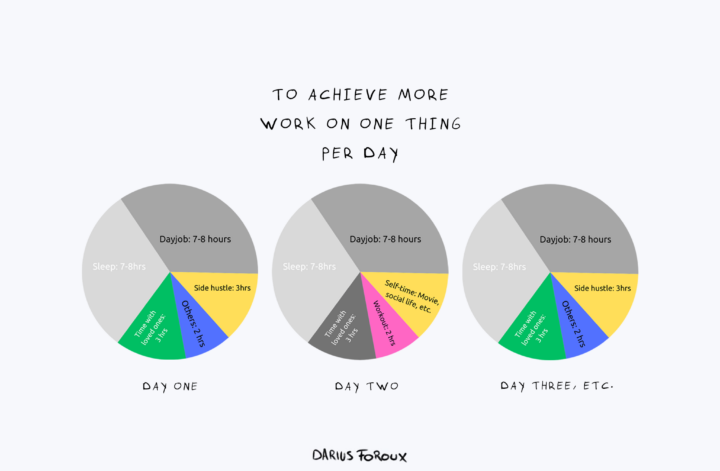So you commit to improving your health, career, or relationships, and after two days, you give up. “I just can’t get motivated.”
We often say those kinds of things without knowing what motivation is. Motivation is simply the reason (or reasons) for acting or behaving the way you do.
The problem is that most of our motivation is short-lived. Some days we feel motivated in the evening, but when the alarm goes off in the morning, all our reasons will go out the window.
You can use self-talk, deadlines, routines, power poses, and other commonly used techniques to get motivated, but you and I both know that none of that stuff lasts. What we need is a strategy to get and stay motivated. Here are 3 things I do.
1. Manage the inner game
The basic idea behind having motivation is having a purpose to do something. No purpose? No action. That’s what motivation ultimately comes down to.
When you lack motivation, you lack purpose. Viktor Frankl, who was a psychiatrist as well as a Holocaust survivor, dedicated his life’s work to this topic. In his book The Will To Meaning, he writes:
“What man actually needs is not a tensionless state but rather the striving and struggling for a worthwhile goal, a freely chosen task.”
This is the inner struggle that we all face. Why do we do what we do? What’s the use? Why would you get out of bed?
According to Frankl, who survived the horrors of a concentration camp, we are the creators of our own destiny. We create motivation. It is not something that is bestowed upon us. Motivation starts from the inside. You decide what your worthwhile purpose in life is, and then you work towards it.
But it’s not as simple as that. You will be tempted by yourself and by others to do different things. Our natural state of mind is distraction. We chase different goals and as a result, we’re confused. Look at this as the game of life.
There are forces that try to take away your purpose. Your task is to manage the inner game. I do that by journaling every day, to remind myself of what drives me. I also seek discomfort. I try to do new things. I challenge myself. I practice philosophy. I meditate. That’s why this is a strategy. You must combine different habits that will help you to manage the inner game.
2. Create an accountability system
Getting motivated starts from within ourselves. But life is not only about the individual. What you’ll find is that our purpose is always related to others—our family, spouse, children, friends, and even strangers.
Next, you want to hold yourself accountable. Personal accountability is the belief that you are willing to take responsibility for your actions. That will make sure you keep going when you screw up. But how do you set up an accountability system for yourself? I use concepts from science:
- The commitment and consistency principle—This is one of the foundational ideas from the book Influence by Robert B. Cialdini. People want to appear consistent in their behavior. If someone asked you whether you are an adventurous type, and you said yes, you tend to act in a way that supports that. You can use this principle against yourself. Simply communicate to people what your purpose is. Say it often. You’ll find that you will do your best to live up to it. My blog helps me to stay consistent.
- Have accountability partners—This is also related to the previous principles. When we talk about our goals with a family member, friend, coach, or co-worker, we’re more likely to live up to our words. Research even shows that the chance of successfully reaching a goal is 95% when you have a consistent appointment with your accountability partner. I’ve been working with a coach on improving my Brazilian jiu-jitsu for a year now. Every Monday, we practice. That keeps me accountable and makes sure I go. You can apply this principle in different ways. I don’t recommend working with friends because they will probably disappoint you. If people in your environment are not serious, hire a coach. Also, I recommend having multiple accountability partners to make sure you don’t rely on a single individual.
3. Reward your spirit
Rewards are widely recommended to increase personal motivation. But this can also backfire if you choose the wrong rewards or let your rewards drive you.
The idea is simple. You want to reward yourself consistently for small accomplishments. When you’ve made progress on your career goals, buy yourself something nice.
I don’t recommend materialistic rewards. The last thing you want is to be motivated by rewards. That defeats the whole purpose. And that’s what most people who write about motivation and rewards get wrong. They try to help but they end up making things a lot worse.
When I talk about rewards, I limit myself to things that give me inner satisfaction. That’s what I mean by spiritual rewards. Often, those things don’t cost that much. For example, after completing a big project, I take a week off work and just read books, do chores around the house, meet friends, and relax.
A lot of people get immense pleasure from food. That can also be used as a reward. Do what works best for you. Simply keep in mind that whatever you’re giving yourself is a bonus. Even if you don’t get the reward, you would still do it.
For example, don’t go to the gym so you can eat a banana split ice cream afterward. Again, that defeats the purpose. Instead of letting rewards dictate your behavior, do things that you actually enjoy. In this case, find a physical activity that you love.
Don’t Question Your Motivation Too Much
Lastly, motivation and purpose can be a rabbit hole. It’s easy to get lost into a tunnel of dark thoughts. Remember that life is meant to be lived. I often get emails from readers who say they lack motivation or purpose.
Remember: The only way to overcome that is to get out of your own head. At some point, you have to stop questioning everything and start experiencing life.
Pick your purpose, communicate it to the world, and then go after it. And along the way, reward yourself for what you’ve done. It’s not an easy thing. But no matter what happens, keep going.




